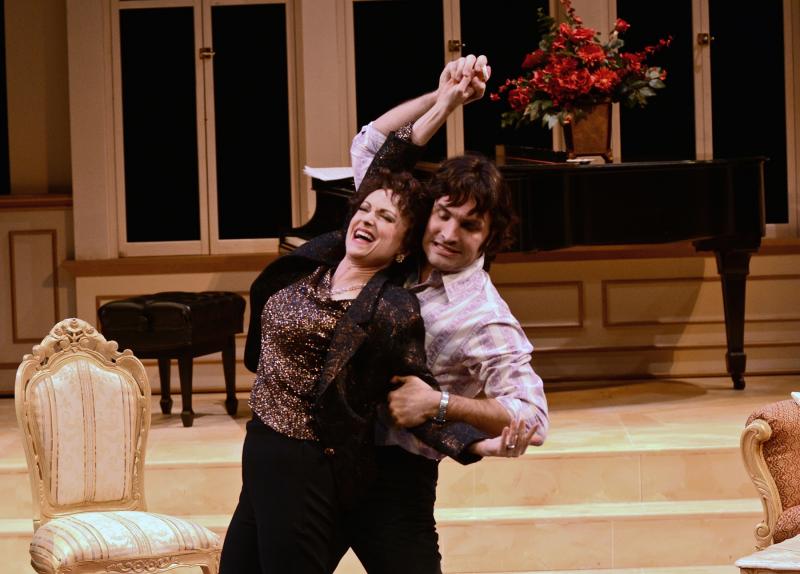Judy Garland Nears The 'End Of The Rainbow' At ICT

With this rather unorthodox introduction, the lights fall on the stage to reveal Judy Garland’s suite in the London Ritz. It is Christmas, 1968, just half a year before the MGM star of "Wizard of Oz" (1939) fame would be found in her bathtub having overdosed on barbiturates. The inevitable tragedy is put out of our minds temporarily, however, as Judy (Gigi Bermingham), her fiancé Mickey Deans (Michael Rubenstone), and her accompanying pianist and friend Anthony (Brent Schindele) enter the stage.
Mickey’s shoulder-length hair and fur-trimmed jacket remind the audience immediately that we have traveled back to the 60’s, as do his colorfully patterned button-down shirts. He sets Judy’s bags down in the middle of the suite, which Judy stubbornly insists is smaller than the rest in the hotel, and where the majority of the show will transpire. Focusing on Garland’s performance run at London’s Talk of the Town nightclub, Peter Quilter’s musical dramedy takes place over just a week, portraying Judy’s increasing day-to-day struggle to meet the expectations of both the public and those closest to her.
Directed by John Henry Davis, it is structured around five performances and a disastrous radio interview, and it features nine hits, including “The Trolley Song” from Meet Me in St. Louis (Minnelli, 1944) “Come Rain or Come Shine,” and of course “Somewhere Over the Rainbow.” With every performance at Talk of the Town, the hotel suite’s window backdrop slides away and the back curtains rise to reveal a three-person band, led by Brent Schindele on the hotel suite’s grand piano. The audience of the play then becomes Judy’s London audience, with whom Garland jokes and, on occasion, at whom she swears. (“Fuck off and come back when they call you” she says by way of an intermission.)
SEE ALSO: Theater Review: 'End Of The Rainbow' At The Ahmanson
Schindele, who is also the musical director, plays beautifully and with feeling, never once breaking character and creating a captivating chemistry between himself and Judy Garland, supporting her when she falters onstage and off. The celebrity herself is portrayed with a ferocious intensity by Gigi Bermingham, who has big shoes to fill and who certainly rises to the challenge. Although her voice does not quite live up to the great singer’s untouchable legacy, it too never breaks character, though it may break with emotion.
Off of the London stage, Bermingham’s sharp humor and eloquent intonations capture the Garland persona that endeared her to the public. More than that, Bermingham captures the insecurities and vulnerabilities that Garland struggled with all her life. With every passing show, her need for pills, for alcohol, and perhaps most of all, for love and affirmation increases until the task of going onstage and performing becomes a grueling existential and sometimes physical battle.

Quilter’s humanistic, if niche, depiction of addiction in the entertainment industry feels especially relevant on its opening weekend, coinciding as it does with the Academy Awards. Garland, who received a Juvenile Academy Award in 1940 for her performances in "Wizard of Oz" and "Babes in Arms," was given weight-loss pills as well as uppers and downers to get her through the intense production processes, likely causing her life-long addiction as well as her deep-seated insecurities concerning her talent and appearance. Though the on-set use of barbiturates and amphetamines has been banned since then, the widespread problem of addiction persists within the entertainment industry, and is largely ignored until someone like Judy is lost to it. Nevertheless, Davis’ heartfelt production of "End of the Rainbow" has only love for Garland, weaknesses and all.
"End of the Rainbow" is playing at the International City Theatre (300 E Ocean Blvd, Long Beach) through March 15. Tickets are $46-48. For more information visit InternationCityTheatre.org
Contact Contributor Sara Itkis here
For more Theater & Dance coverage click here



